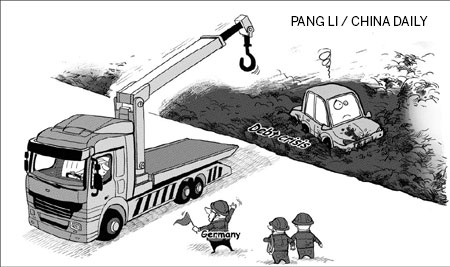
German Chancellor Angela Merkel's visit to China on Thursday and Friday will be a good opportunity for her to brief China's leaders on the outcome of the European Union summit on Monday. Merkel will also argue that it is in China's interest to invest more in Europe.
The German chancellor will be pleased with the EU summit results, which endorsed Berlin's long-standing wish for more fiscal discipline in EU member states. But she will still face pressure to provide more funds for struggling Greece and to take more measures to boost domestic demand.
The summit agreed to a fiscal compact, committing signatories to introduce a "debt brake" to national legislation. The treaty aims to force eurozone countries with high debt levels to bring their budget deficits down to 0.5 percent of their economic output, which is not an easy task. New voting rules, penalties for non-compliance and EU surveillance mechanisms should ensure the new treaty has teeth. EU member states (except the United Kingdom and the Czech Republic) expect to sign the new treaty next month and it will come into force once the 12 euro countries have ratified it.
The agreement on the fiscal compact came at a time when many political leaders and International Monetary Fund (IMF) Managing Director Christine Lagarde were questioning the austerity-centered policy backed by Merkel. Some have likened the new pact to outlawing Keynesian-style fiscal stimulus.
The EU summit backed away from proposals to increase the euro firewall (the European Financial Stability Facility) if necessary from 500 billion to 750 billion, something that the IMF has argued for to improve market sentiment. Merkel, however, is likely to agree to such an increase at the next EU summit in March.
As leader of Europe's biggest economy, Merkel has had to tread a careful line between stumping up the largest sum of money for the euro bailout fund and assuring German voters that the money would indeed be put to a good cause. German public opinion is tired of bailing out the financially less prudent countries in the eurozone.
In addition, the summit agreed to measures to promote employment, cut red tape for small and medium-sized enterprises, and complete the single market. Priority will be given to the digital market and the energy market.
Merkel will not land in Beijing with a begging bowl nor will she be pressing China to buy more European bonds. But she is likely to explain to President Hu Jintao and Premier Wen Jiabao that it is very much in China's interest to support the EU in the current crisis.
The EU is the biggest market for Chinese exports and any economic downturn in Europe would have damaging consequences for China. Trade between the EU and China reached $566 billion last year, almost 10 percent of the total global trade flow. Europe accounts for just over 20 percent of global GDP and about one-fifth of global trade. Six of the 10 most competitive economies in the world are European. More than one third of the world's top firms are based in Europe. Also, the average per capita GDP in the EU is about $32,500 compared to about $4,500 in China. So Europe still matters in the global economy.
Given that she will be accompanied by a large business delegation, Merkel will also make it clear that the EU wants to see a level playing field for German and EU companies operating in China, for companies such as Siemens and Thyssen have complained about unfair practices. But Chinese enterprises will complain about the investment barrier in Europe and the difficulty of importing high technology.
Although the eurozone crisis will be a central theme, Merkel will also discuss global economic developments and the prospects for growth, which will be a priority for Mexico's G20 presidency.
Further issues include Iran, though the two sides take different views on further sanctions to try and stop the alleged nuclear weapons program that Teheran is developing. China has described the latest EU sanctions, including a ban on Iranian oil imports, as "not helpful".
Syria will also feature high on the agenda and Merkel will try and convince China to support the proposals put forward by the Arab League at the United Nations, which are aimed at political change in Damascus.
European and bilateral issues will be interlinked in Merkel's visit. This year marks the 40th anniversary of diplomatic relations between Germany and China. The bilateral relationship has been strengthened in recent years through regular government-to-government consultations. These have covered areas such as urbanization, health and the environment. And Merkel's visit can be viewed as a further demonstration of the importance Berlin attaches to the relationship.
The author is director of the EU-Asia Centre in Brussels.